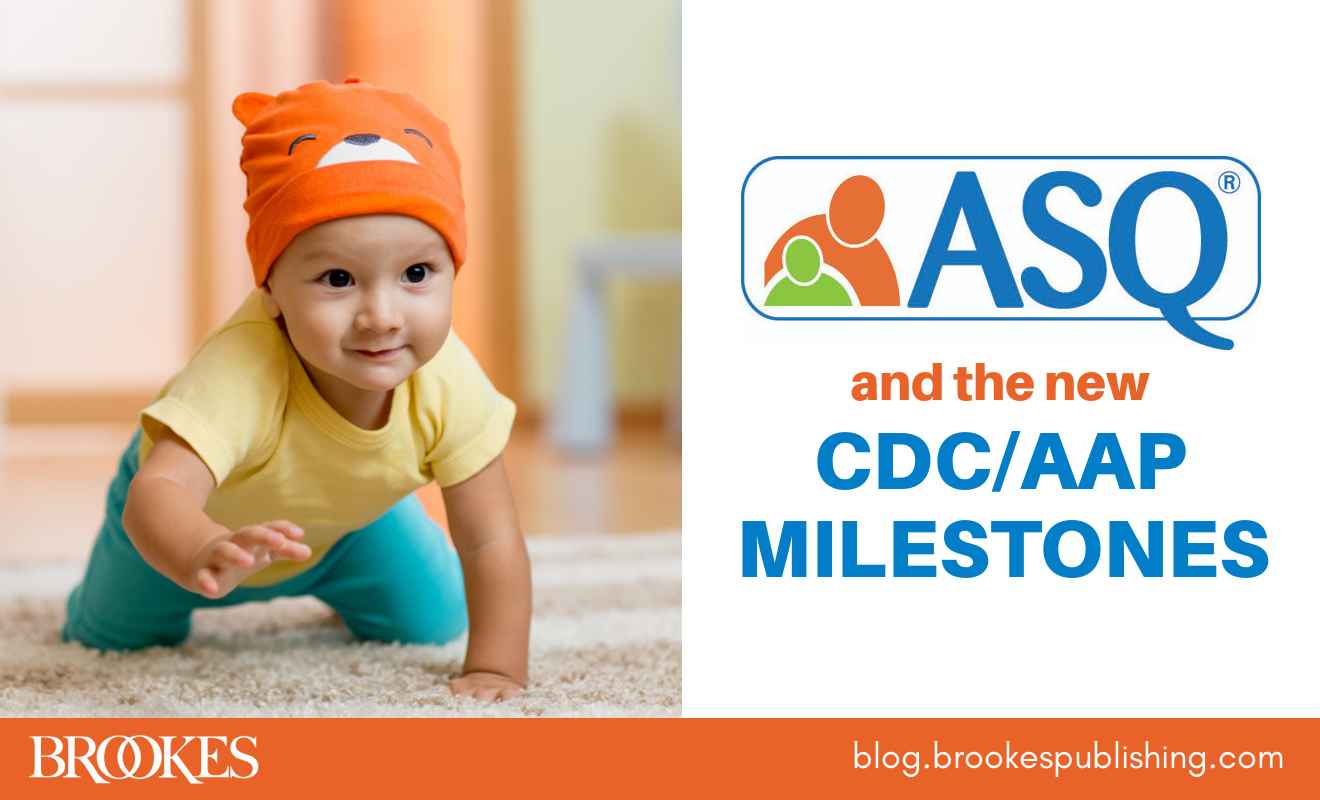ASQ and the New CDC Milestones: Your Questions Answered
April 13, 2022
Recently, the CDC and AAP released updated developmental milestones for young children from 2 months through 5 years of age. With this new development came some questions in the field: Why were the updates made, and is ASQ still a valid screener in light of the changes? Why is developmental screening still important—can’t parents and professionals just monitor children’s progress toward the milestones?
Featuring insights from ASQ co-developer Jane Squires, today’s blog post will guide you through the answers to these critical questions—and reiterate the essential role of screening in every young child’s healthy development.
Developmental milestones: The why behind the updates
The updates to the milestones were actually developed to better identify potential areas of concern as early as possible, so that action can be taken if needed. Jane Squires, who was on the research team that collaborated on the updated milestones, further clarifies the main reason behind the recent changes:
“As the milestones were originally written, they reflected the age at which 50% of children should be doing the targeted skills,” Squires explains. “As a result, it often wasn’t clear whether the pediatrician or caregiver should take further action, such as scheduling a referral. The updated milestones were chosen to reflect what most children, 75% or more, would be expected to be able to do by specified ages to better identify potential concerns. By improving the milestones using the most current empirical literature—including ASQ-3 data—we aimed to make it clearer to parents and other care providers that missing a milestone was something to take action on.”
The newly updated milestones also include expanded tips and activities and additional open-ended questions. These will be helpful for supporting children’s development and facilitating conversations between parents, health care providers, and others. (For more information on talking about and using the new milestones, see this helpful toolkit of articles and resources compiled by Help Me Grow.)
ASQ: Still valid with no changes
In light of the improvements to the developmental milestones, some early childhood professionals may be wondering if ASQ-3 and ASQ:SE-2 are still valid screeners, and whether they’ll need to be updated to reflect the new milestones. Can programs keep using the screener they trust with confidence, and with no interruption?
The short answer is yes, both ASQ-3 and ASQ:SE-2 are still valid screeners, and no, updates will not be needed to either screener to reflect the milestone changes. That’s because the ASQ questionnaires were developed through an extensive research process that was not tied to or based on the CDC milestones—in fact, the earlier editions of ASQ actually predated the milestones. And for this latest milestone update, ASQ data was even used to inform the changes:
“ASQ-3 was used as one of the sources of empirical data upon which the newly updated milestones were based,” Jane Squires says. “The skills on ASQ-3 average around the 75% skills level, meaning 75% of children in each age range can do the skills. Thus, the skills targeted in ASQ-3 remain valid and already reflect milestones similar to the ones the CDC has just released.”
ASQ was a trailblazing tool from the start—it pioneered the highly effective method of parent-completed screening, and it revolutionized the way we track young children’s progress. Now the screener trusted by millions is helping to shape the developmental milestones used to guide parents and professionals, ensuring that the adults in a child’s life know what to look for and what to expect from birth to age 5.
Beyond milestones: Why developmental screening is a must
Since ASQ data was used to inform the updated milestones, some may ask why developmental screening is still a must. If the milestones are based on reliable data, couldn’t we just monitor children’s progress toward them, instead of screening at regular intervals?
First, as Jane Squires points out, screening and milestones are two very different things. “Milestones are meant to be used as an informal method for reviewing development as children grow: Is my baby on target? What are the next skills to practice with them?” says Squires. “Milestones are not meant as a substitute for normative developmental and behavioral screening, which should be completed at periodic intervals in the first 5 years.” In other words, milestones are just basic guidelines to help parents celebrate their children’s progress and raise a flag if a certain area seems like it might need attention.
While developmental milestones are helpful, they’re not a replacement for the valuable data and peace of mind a screener can provide. Monitoring milestones can bring up important questions, but only screening can give you the answers. Milestones can be an early indicator of possible concerns, but only a screener like ASQ gives you the clear, reliable information for understanding what a child needs and how to help them. Because ASQ is research-based and validated, you can be confident that the results are accurate, and you’ll know what to do next to support each child in the areas where they might need help.
Screening and milestones may be different, but they’re also complementary—ideally, they should be used in tandem to support development. Jane Squires notes: “The milestones are tools that are part of a larger process that includes monitoring, conversations about development, and periodic developmental and behavioral screening.” Use milestones to facilitate important talks with parents about their child’s progress, and then screen at the recommended intervals to check the child’s development and determine if followup actions are needed. The AAP continues to recommend developmental and behavioral screening for all children during regular well-child visits at 9 months, 18 months, and 30 months.
Used together, developmental milestones and regular screening can help parents and professionals track child progress, identify potential concerns early, and ensure that every young child gets off to the best start in life. Keep using ASQ with confidence to check children’s development—and for more information on screening and milestones to share with parents, explore the links below.
CDC: Developmental Monitoring & Screening
New milestone checklists for 2 months to 5 years
“For Parents” page on the ASQ website




Write a Comment
Your email address will not be published. Required fields are marked *
Post a Comment